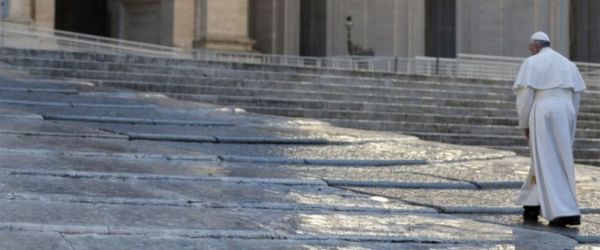This Sunday’s Gospel (cf. Mk 9:38-43, 45, 47-48) presents us with one of those characteristics that are very instructive about Jesus’ life with his disciples. They had seen a man — who did not belong to the group of Jesus’ followers — casting out demons in Jesus’ name, and thus they wanted to forbid him to do so. With the zealous enthusiasm typical of young people, John refers the matter to the Teacher, seeking his support. However, quite to the contrary, Jesus replies: “Do not forbid him; for no one who does a mighty work in my name will be able soon after to speak evil of me. For he that is not against us is for us” (vv. 39-40).
John and the other disciples display a ‘closed’ attitude when faced with a circumstance that does not fit with their programme, in this case the action, albeit good, of a person ‘outside’ the circle of followers. Jesus on the other hand, appears very free, fully open to the freedom of the Spirit of God, whose actions are not limited by any confines nor boundaries. Jesus wants to educate his disciples — and us today — on this inner freedom.
It is good for us to reflect on this episode and to perform a small examination of conscience. The disciples’ attitude is very human, very common, and we can observe this in Christian communities throughout history, probably in ourselves as well. In good faith, indeed with zeal, one would like to protect the authenticity of a certain experience, safeguarding the founder or leader from false impersonators. But at the same time, there is a sort of fear of ‘competition’ — and this is bad: the fear of competition —, that someone may steal new followers, and we are thus unable to appreciate the good that others do: it is not good because he is ‘not one of us’, they say. It is a form of self-referentiality. Actually, there is the root of proselytism here. And the Church — Pope Benedict used to say — does not grow through proselytism; it grows by attraction, that is, it grows by bearing witness to others with the strength of the Holy Spirit.
God’s great freedom in giving himself to us represents a challenge and an exhortation to modify our behaviours and our relationships. It is the invitation which Jesus addresses to us today. He calls us not to think according to the categories of ‘friend/enemy’, ‘us/them’, ‘those who are in/those who are out’, ‘mine/yours’, but rather to go beyond, to open our heart in order to be able to recognize God’s presence and action, even in unusual and unpredictable environments that are not part of our circle. It is a matter of being more attentive to the authenticity of the good, the beautiful and the true that is done, rather than to the name and the origin of the one who does it. And — as the remaining part of the Gospel suggests to us today — instead of judging others, we must examine ourselves and ‘sever’, without compromise, all that can scandalize those persons who are weakest in faith.
May the Virgin Mary, an example of docile openness to God’s surprises, help us to recognize the signs of the Lord’s presence in our midst, so that we may find him everywhere he manifests himself, even in the most unthinkable and unusual situations. May she teach us to love our community without jealousy or closure, always open to the vast horizon of the action of the Holy Spirit.
[Pope Francis, Angelus 30 September 2018]












